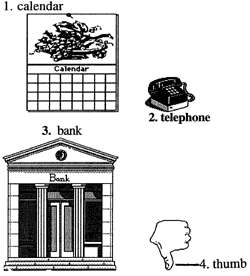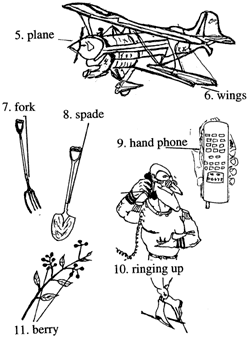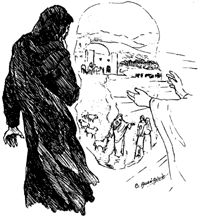Unit 32: Adverbs of Time
Pictured Words
New Words

| 1.calender
|
| 2.telephone
|
| 3.bank
|
| 4.thumb
|

| 5.plane
|
| 6.wings
|
| 7.fork
|
| 8.spade
|
| 9.hand phone
|
| 10.ringing up.
|
| 11.berry
|
Nouns
Adjectives
Sayings
Now we may see the plane: it seems to be a jet.
We now have some knowledge of how we make use of our brains to tell the time.
Did you have the wrong number yesterday when you were trying to say something?
Yesterday a plane came through the mist and it was a jet.
Tomorrow, we will come together to say some more about this suggestion.
Today, go to the hardware place and get a fork for the garden.
When you have come, then you will be able to take that spade into the garden.
They now say on the radio that for ever telegrams must be sent by the bank to make payments.
Will you be for ever making use of my electric goods?
Why not get you own?
Planes will not ever be safer than trains.
Adverbs of Time
The time at which an action is expressed may be seen in the words: "now", "then", "yesterday", "tomorrow", "ever", and "together" (which may be used for both degree and time):
Now
now put you hand against all he has.
now I have become their song.
now give ear to my words.
now my mouth is open.
Then
but then you gave me up.
why then did you make me?
then truly your face will be lifted up.
why then do you give me comfort?
then I will give praise to you .
Yesterday
The same yesterday, today and forever .
For we are but of yesterday.
Tomorrow
go, and come again, and tomorrow I will give.
the Lord says tomorrow about this time .
Ever
he will go on living for ever .
have you ever seen destruction come?
we will be for ever with the Lord .
he is ever living to make prayer
Together
a day when the sons of the gods came together.
all of them come together in a mass.
they get together under the thorns .

The Troubles Of Job
There was a man in the land of Uz whose name was Job.
He was without sin and upright, fearing God and keeping himself far from evil.
And he had seven sons and three daughters.
And of cattle he had seven thousand sheep and goats, and three thousand camels, and a thousand oxen, and five hundred she-asses, and a very great number of servants.
And the man was greater than any of the sons of the east.
His sons regularly went to one another's houses, and every one on his day gave a feast: and at these times they sent for their three sisters to take part in their feasts with them.
And at the end of their days of feasting, Job sent and made them clean, getting up early in the morning and offering burned offerings for them all.
For Job said, It may be that my sons have done wrong and said evil of God in their hearts.
And Job did this whenever the feasts came round.
And there was a day when the sons of the gods came together before the Lord, and Satan came with them.
And the Lord said to Satan, where do you come from?
Satan said in answer, From wandering this way and that on the earth, and walking about on it.
And the Lord said to Satan, Have you taken note of my servant Job, for there is no one like him on the earth, a man without sin and upright, fearing God and keeping himself far from evil?
Satan said in answer to the Lord, Is it for nothing that Job is a god-fearing man?
Have you yourself not put a wall round him and his house and all he has on every side, blessing the work of his hands, and increasing his cattle in the land?
But now, put out your hand against all he has, and he will be cursing you to your face.
The Lord said to Satan, See, I give all he has into your hands, only do not put a finger on the man himself.
And Satan went out from before the Lord.
Additional Reading
The story we read here is only a part of the argument put forward in the Book of Job.
It is a very picturesque account of an interesting meeting between God and Satan.
There is a different view put forward at the close of the Book.
There, God gives a full reward to Job for all his goodness and for being able to see that God is allmighty and has all knowledge.
In between these first and last parts of the Book there is an account of what Satan did to Job and of what his friends thought about it all.
These two parts of the Book are very old stories, as is in keeping with the thoughts man has always had about his changing conditions of life.
He has seen these as a competition between good and evil or, as we see here, between God and Satan.
The Book of Job makes it quite clear that the most important thing is for man to live in harmony with God's designs for him.
That is the only way of true happiness.
Job came face to face with many troubles.
His story tells us about the nature of God.
The question is equally common to the Jewish, Muslim and Christian religions, and it may be seen in Eastern ideas of "yin and yang" forces in nature.
To each, the Book as a whole shows that God is greater than any system of thinking that man can put forward.
God is so great that our limited minds are not able to get a knowledge of his ways.
The story is often seen by writers as a story about Job's physical illnesses.
When we take a close look at what is said in the Book of Job, we see that he did not say as much about his physical condition, cruel as it was, as he did about his reaction to the change in his
He did not seem to be in agreement with the view of his friends that God gave well being to the good and punishments to the bad.
Of course, that was the view taken by common agreement in his times.
In fact, that view has always had great attraction to thinkers right throughout time.
Job was more conscious of his relations with the people of his own town, with the commoners in his group, and with his own circle of friends than with the physical troubles that were his.
His near circle of friends were the ones that gave him most pain.
They said he was ill because he had done wrong.
But, he was not in agreement with them.
He said he had not done anything to give God a reason for having him punished.
It was quite usual for the circle of people among whom he had lived to have property and spend their time in play.
Others had to do hard work, but they had lives of ease.
So, it seemed to Job's friends that he had done something for which to be punished, even if only for his own personal profit.
Job put strong arguments against that idea.
Helpful Notes
| land of Uz
| we have no knowledge of this land now.
|
| keeping far from evil
| a right living man.
|
| oxen and asses
| these were signs of progress, a man of substance.
|
| offering burned offerings
| a religious service.
|
| put a wall round
| given special care.
|
| picturesque account
| an interesting way of saying things.
|
| yin and yang
| the view of life taken by Asian countries.
|
| physical condition
| state of health.
|
| conscious of relations
| having knowledge of other's feelings.
|
Interesting Facts and Records
Weather And Nature
Early man was very close to nature.
His whole life was in rhythm with the changes of the seasons.
So, it comes as no surprise that one of the oldest books, that of Job, says much about natural things, as we may see here:
By whom has the way been cut for the flowing of the rain, and the flaming of thunder;
Causing rain to come on the land ...
to make dry land green with young grass?"
Life was on a completely different plane then by comparison with now.
In those times there were no railways, radios, telephones or telegrams.
These are the products of modern hardware in today's way of life.
Time was not being troubled in early times by calendars with their weeks and months.
Man could comb the forests for wild berries, take the liquid stored in a sweet fruit.
He could go digging with a spade in the fields.
He could smell with his nose the perfume of the flowers.
His only desire was to get knowledge of nature's secrets and unlock them for his own existence.
In this, the weather had a decisive role.
There are two main effects of changes in the weather.
There are the short bursts that man is conscious of from day to day.
There are also trends over a long time that he is unable to sense as they are occurring.
of rain, ice and fire" is a short burst that can have great effects.
In battle, ice and thunder in an electrical storm often sent destruction on a lightly dressed army.
It is recorded that early this century the Chinese were putting the Mongols to flight.
A sudden jet of icy air came striking on them.
At this, the heavily clothed Mongols got the upper hand.
We read of similar destruction happening in the Scriptures.
Gideon made his attack under cover of darkness.
A thick mist or a coal black bank of cloud were just as effective.
Farmers have always lived close to nature.
For hundreds of years farmers have put their seed into the earth.
They would wait for rain before breaking up the land with forks or spades.
They would let the ice and snow of winter make the earth soften further and they would put out the plants at the right turn of the moon.
These are all short time effects of changing weather.
There are also long time effects.
The events that the prophets had so much to say about all took place while a very long time change was taking place.
Men who have become experts on changes in the weather tell us that the earth got gradually colder from the time of King David until the tail end of the times of the prophets.
It then began to get warmer.
For these reasons water turned to ice in the north as it got colder.
When the weather became warmer this ice melted and sea levels rose.
The rise in the sea was enough to make the town of Tyre, on the edge of the Mediterranean, go beneath the waves.
The strange thing is that the prophet Isaiah had said this would happen hundreds of years before.